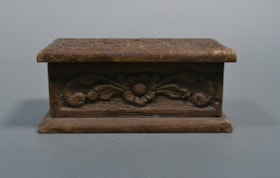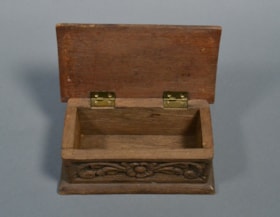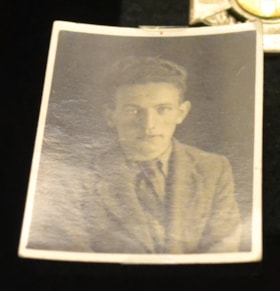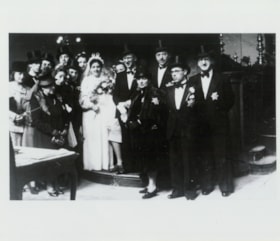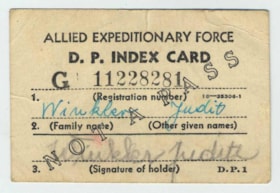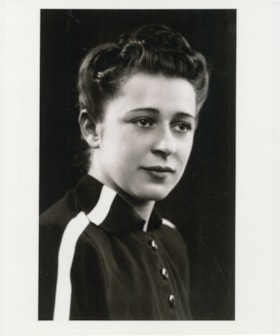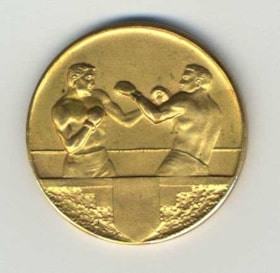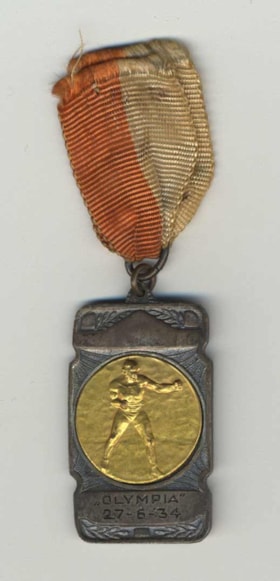Narrow Results By
Box
https://www.cjhn.ca/link/cjhn47411
- Collection
- Montreal Holocaust Museum
- Description Level
- Item
- Material Type
- object
- Physical Description
- Box : carved, hinged : brown, brass ; Ht: 6,5 cm x W: 8,1 cm x De: 14,2 cm
- Collection
- Montreal Holocaust Museum
- Description Level
- Item
- Material Type
- object
- Physical Description
- Box : carved, hinged : brown, brass ; Ht: 6,5 cm x W: 8,1 cm x De: 14,2 cm
- Other Title Information
- Container
- Physical Condition
- Excellent
- Notes
- Wooden box with high-relief floral designs on each side and a filligree leaf design on the lid. Lid is attached to the base with 2 hinges. Narrative: The box was made by donor, David Kropveld, in woodworking class pre-war Amsterdam. David Kropveld was born in 1918 in Amsterdam. The university he was to attend was shut down by the Germans in 1940. In July 1940, David and his father joined the White Brigade resistence group in the south of France. As members of the White Brigade, David and his father gave up their Jewish identities. In October 1942, David was arrested while smuggling war-related information between occupied and Vichy France. He was tortured for ten days before being released. He was reunited with his father in Brussels, but the two were arrested by Gestapo officers one week later. They were incarcerated for three months and deported to Auschwitz concentration camp (Poland). Father and son wore the badges of political prisoners and were selected for the slave labour camp of Monowitz, where they stayed for about five days prior to being transferred to camp of Treblinka (Poland). In Treblinka, David witnessed his father’s murder at the hands of a guard. In the fall of 1944, a guard recognized David as a boxer he had admired and had him transferred back to Auschwitz and Monowitz in December 1944 to compete boxing matches against other prisoners. In December 1944, David managed to escape the death march with a few iother prisoners. He was rescued shortly after and brought to a hospital until his health improved. No members of his family survived the war. In the summer of 1945, David met his wife. In 1947, the couple emigrated to Cuba, and in 1950, to Montreal where David began a successful career as a butcher. He immediately became involved in the underground in Holland, Belgium, and France. He was involved in transporting children to safe places. He participated in armed attacks of German convoys. He suffered two shootings and was arrested in France-subsequently sent to the camp of Breendock in Belgium and then to Treblinka, Sosnovitch, and Auschwitz. He was liberated by the Russian Amy.
- Accession No.
- 1990.83.29
- Name Access
- Kropveld, David
- Archival / Genealogical
- Archival Descriptions
- Repository
- Montreal Holocaust Museum
Images
Certificate
https://www.cjhn.ca/link/cjhn59788
- Collection
- Montreal Holocaust Museum
- Description Level
- Item
- Material Type
- textual record
- Physical Description
- Certificate : Paper : Typewritten : Ink : Beige, black, grey ; Ht: 8,5 cm x W: 20,5 cm
- Date
- April 22, 1943
- Collection
- Montreal Holocaust Museum
- Description Level
- Item
- Material Type
- textual record
- Physical Description
- Certificate : Paper : Typewritten : Ink : Beige, black, grey ; Ht: 8,5 cm x W: 20,5 cm
- Other Title Information
- Documentary Artifact
- Date
- April 22, 1943
- Physical Condition
- Good
- Language
- English
- Notes
- Slip of paper creased vertically, form typed on front with handwritten details. Form indicates that David Kropveld was a Displaced Person from Holland, and had been captured/deported on 1943/4/22 as a Political Prisoner Narrative: David Kropveld was born on 1918/1/3 in Amsterdam, Holland. He was the third child of Samuel Kropveld (1884/3/?) and Goedge Van Cleef (1894). His father had studied to be a doctor before he was enlisted in 1916. His mother was a nursery school teacher until her marriage. As a boy he participated in Boy Scouts, acrobatic and boxing training. He studied at a commercial college, and opened a silver, gold, and diamond business during the Great Depression. In 1936 he was chosen to represent Holland as a boxer in the Olympics, but he chose not to go. He trained as a naval officer, and was prepared to attend university when the Germans occupied Holland in May 1940. In July, David and his father joined the White Brigade resistance group in the south of France. As members, David and his father gave up their Jewish identities and were responsible for taking children to safe houses and participating in armed attacks on German convoys. During this time David used the alibis Charles Seegers and Dan Daladien. In October 1942, David was arrested while smuggling war-related information between occupied and Vichy France. He was tortured for ten days before escaping with the aid of two men from the resistance. He was reunited with his father in Brussels, but the two were arrested by Gestapo officers one week later. They were incarcerated for three months and deported to Auschwitz where they were considered political prisoners and were selected for the slave labor camp at Monowitz Camp. They remained there for 5 days prior to being transferred to Treblinka Camp. In Treblinka, David witnessed his father’s murder at the hands of a guard. During this time Goedge had been sent to Sobibor where she was gassed and cremated on 1943/5/7. In the fall of 1944, a guard recognized David as a boxer he admired and had him transferred back to Auschwitz and on to Monowitz in December 1944 to compete in boxing matches against other prisoners. The rest of David’s family was killed during the war. Of his siblings Gretha (1914) died of hunger in Malapane, Poland with her husband in September 1942, Hartog (1916) was injured as a sergeant in the army and executed after his capture on 1943/6/30, Rosette (June 1922) was gassed in Sobibor on 1943/7/23 while pregnant, and Israel (March 1924) was beaten to death during a protest on a transport bound for Buchenwald. In December 1944, David managed to escape the death march with a few other prisoners. He was rescued shortly after and brought to a hospital until his health improved, although he never fully recovered and spent most of his life physically handicapped. In the summer of 1945, David met his wife, Annie Cohen. They had two sons, Mike and Phillip Kropveld. In 1947, the couple immigrated to Cuba, and then, in 1950, to Montreal, Canada, where David began a successful career as a butcher. He died in Montreal on 2008/11/26 at the age of 91.
- Accession No.
- 1990.83.4
- Name Access
- Kropveld, David
- Archival / Genealogical
- Archival Descriptions
- Repository
- Montreal Holocaust Museum
Images
Certificate
https://www.cjhn.ca/link/cjhn59789
- Collection
- Montreal Holocaust Museum
- Description Level
- Item
- Material Type
- textual record
- Physical Description
- Certificate : Paper : Typewritten : Ink : Beige, black, blue ; Ht: 14 cm x W: 20 cm
- Date
- July 21, 1945
- Collection
- Montreal Holocaust Museum
- Description Level
- Item
- Material Type
- textual record
- Physical Description
- Certificate : Paper : Typewritten : Ink : Beige, black, blue ; Ht: 14 cm x W: 20 cm
- Other Title Information
- Documentary Artifact
- Date
- July 21, 1945
- Physical Condition
- Good
- Language
- Dutch
- Notes
- Page creased horizontally and vertically, Dutch Militair Repatrieering Commissaris letterhead, stamped. Form grants permission for David Kropveld to travel to Amsterdam in July 1945. Narrative: David Kropveld was born on 1918/1/3 in Amsterdam, Holland. He was the third child of Samuel Kropveld (1884/3/?) and Goedge Van Cleef (1894). His father had studied to be a doctor before he was enlisted in 1916. His mother was a nursery school teacher until her marriage. As a boy he participated in Boy Scouts, acrobatic and boxing training. He studied at a commercial college, and opened a silver, gold, and diamond business during the Great Depression. In 1936 he was chosen to represent Holland as a boxer in the Olympics, but he chose not to go. He trained as a naval officer, and was prepared to attend university when the Germans occupied Holland in May 1940. In July, David and his father joined the White Brigade resistance group in the south of France. As members, David and his father gave up their Jewish identities and were responsible for taking children to safe houses and participating in armed attacks on German convoys. During this time David used the alibis Charles Seegers and Dan Daladien. In October 1942, David was arrested while smuggling war-related information between occupied and Vichy France. He was tortured for ten days before escaping with the aid of two men from the resistance. He was reunited with his father in Brussels, but the two were arrested by Gestapo officers one week later. They were incarcerated for three months and deported to Auschwitz where they were considered political prisoners and were selected for the slave labor camp at Monowitz Camp. They remained there for 5 days prior to being transferred to Treblinka Camp. In Treblinka, David witnessed his father’s murder at the hands of a guard. During this time Goedge had been sent to Sobibor where she was gassed and cremated on 1943/5/7. In the fall of 1944, a guard recognized David as a boxer he admired and had him transferred back to Auschwitz and on to Monowitz in December 1944 to compete in boxing matches against other prisoners. The rest of David’s family was killed during the war. Of his siblings Gretha (1914) died of hunger in Malapane, Poland with her husband in September 1942, Hartog (1916) was injured as a sergeant in the army and executed after his capture on 1943/6/30, Rosette (June 1922) was gassed in Sobibor on 1943/7/23 while pregnant, and Israel (March 1924) was beaten to death during a protest on a transport bound for Buchenwald. In December 1944, David managed to escape the death march with a few other prisoners. He was rescued shortly after and brought to a hospital until his health improved, although he never fully recovered and spent most of his life physically handicapped. In the summer of 1945, David met his wife, Annie Cohen. They had two sons, Mike and Phillip Kropveld. In 1947, the couple immigrated to Cuba, and then, in 1950, to Montreal, Canada, where David began a successful career as a butcher. He died in Montreal on 2008/11/26 at the age of 91.
- Accession No.
- 1990.83.5
- Name Access
- Kropveld, David
- Archival / Genealogical
- Archival Descriptions
- Repository
- Montreal Holocaust Museum
Images
David Kropveld
https://www.cjhn.ca/link/cjhn75139
- Collection
- Montreal Holocaust Museum
- Description Level
- Item
- Material Type
- graphic material
- Physical Description
- Photograph : Paper : b&w
- Date
- [Prior to 1940]
- Collection
- Montreal Holocaust Museum
- Description Level
- Item
- Material Type
- graphic material
- Physical Description
- Photograph : Paper : b&w
- Other Title Information
- Documentary Artifact
- Date
- [Prior to 1940]
- Physical Condition
- Good
- Notes
- B&W portrait with white border. Portrait of David Kropveld as a boy, wearing a suit and tie. Narrative: Portrait of the donor, David Kropveld. David Kropveld was born on January 3, 1918 in Amsterdam, the Netherlands. David took up boxing as a young man and participated in competitions. In July 1940, David and his father joined the White Brigade resistance group in the south of France, passing as non-Jews. In October 1942, David was arrested while smuggling war-related information between occupied and Vichy France. He was tortured for ten days before being released. He was reunited with his father in Brussels, but the two were arrested by Gestapo officers one week later. They were incarcerated for three months and deported to Auschwitz concentration camp. Father and son wore the badges of political prisoners and were selected for the slave labour camp of Monowitz, where they stayed for about five days prior to being transferred to Treblinka. In Treblinka, David witnessed his father’s murder at the hands of a guard. In the fall of 1944, a guard recognized David as a boxer he had admired and had him transferred back to Auschwitz and Monowitz in December 1944 to compete boxing matches against other prisoners. In December 1944, David managed to escape the death march with a few iother prisoners. He was rescued shortly after and brought to a hospital until his health improved. No members of his family survived the war. In the summer of 1945, David met his wife. In 1947, the couple emigrated to Cuba, and in 1950, to Montreal where David began a successful career as a butcher.
- Accession No.
- 2011X.23.01
- Name Access
- Kropveld, David
- Archival / Genealogical
- Archival Descriptions
- Repository
- Montreal Holocaust Museum
Images
Herman de Leeuw and Annie Pais with family members at their wedding
https://www.cjhn.ca/link/cjhn48395
- Collection
- Montreal Holocaust Museum
- Description Level
- Item
- Material Type
- graphic material
- Physical Description
- Photograph : Paper ; Ht: 21,6 cm x W: 24,6 cm
- Date
- 1942
- Collection
- Montreal Holocaust Museum
- Description Level
- Item
- Material Type
- graphic material
- Physical Description
- Photograph : Paper ; Ht: 21,6 cm x W: 24,6 cm
- Other Title Information
- Documentary Artifact
- Date
- 1942
- Physical Condition
- Excellent
- Notes
- b&w, white border. Group portrait. A young couple pose with the members of their wedding party at the Sephardic synagogue in Jewish Quarter of Amsterdam. They are wearing the Star of David (a woman even has it sewn to her fur stole. Left to right are Fifi Sjouwerman, Sieg Pekel, Mrs. Pais (the bride's mother), Jaap de Leeuw (Fifi's fiancé), Rachel de Leeuw (the groom's sister), Samuel Schrijver, S. Barzilay (Rachel's fiancé), Ida de Leeuw, Anne de Leeuw-Pais, Ina de Leeuw, Herman de Leeuw, Heintje de Leeuw (the groom's mother), Jacques Pais (the bride's father), Abraham Pais (the bride's brother), and Sam de Leeuw (the groom's father).
- Accession No.
- 1995.18.11
- Name Access
- Schryver, Samuel
- Archival / Genealogical
- Archival Descriptions
- Repository
- Montreal Holocaust Museum
Images
Herman de Leeuw at his wedding to Annie Pais
https://www.cjhn.ca/link/cjhn48394
- Collection
- Montreal Holocaust Museum
- Description Level
- Item
- Material Type
- graphic material
- Physical Description
- Photograph : Paper ; Ht: 21,6 cm x W: 25,3 cm
- Date
- 1942
- Collection
- Montreal Holocaust Museum
- Description Level
- Item
- Material Type
- graphic material
- Physical Description
- Photograph : Paper ; Ht: 21,6 cm x W: 25,3 cm
- Other Title Information
- Documentary Artifact
- Date
- 1942
- Physical Condition
- Excellent
- Notes
- b&w, white border. Indoors. Young groom wearing a top hat taking a sip of wine during a wedding ceremony at the Sephardic synagogue in Jewish Quarter of Amsterdam. One of the attendants on the right is wearing a Star of David which reads ‘‘Jood’’.
- Accession No.
- 1995.18.10
- Name Access
- Schryver, Samuel
- Archival / Genealogical
- Archival Descriptions
- Repository
- Montreal Holocaust Museum
Images
Het Achterhuis
https://www.cjhn.ca/link/cjhn45492
- Collection
- Montreal Holocaust Museum
- Description Level
- Item
- Material Type
- book
- Physical Description
- Book : printed : red, blue-beige, black ; Ht: 19,0 cm x W: 10,9 cm
- Date
- February, 1948
- Collection
- Montreal Holocaust Museum
- Description Level
- Item
- Material Type
- book
- Physical Description
- Book : printed : red, blue-beige, black ; Ht: 19,0 cm x W: 10,9 cm
- Other Title Information
- Documentary Artifact
- Date
- February, 1948
- Creator
- Frank, Anne
- Physical Condition
- Poor
- Language
- Dutch
- Notes
- 253 pages, hardcover. First edition, third printing of the Dirary of Anne Frank.Red cover with blue-beige border and lettering, with visible fibres. Plain blue-beige back cover with visible fibres. Spine has red lettering. Inside cover pages are beige with darker warp and weft pattern. Diary format with a b&w photograph of the author is located opposite the title page. 2 return address stamps on the publishing information page, with handwritten inscription.
- Accession No.
- 2005.34.01
- Name Access
- Schryver, Samuel
- Archival / Genealogical
- Archival Descriptions
- Repository
- Montreal Holocaust Museum
Images
Identification card
https://www.cjhn.ca/link/cjhn48386
- Collection
- Montreal Holocaust Museum
- Description Level
- Item
- Material Type
- textual record
- Physical Description
- Identification card : Paper : pin, black ; Ht: 4,25 in. x W: 3 in.
- Date
- August 29, 1941
- Collection
- Montreal Holocaust Museum
- Description Level
- Item
- Material Type
- textual record
- Physical Description
- Identification card : Paper : pin, black ; Ht: 4,25 in. x W: 3 in.
- Other Title Information
- Documentary Artifact
- Date
- August 29, 1941
- Physical Condition
- Excellent
- Language
- Dutch
- German
- Notes
- Three-fold paper card for Samuel Schryver with identity photograph and stamped with "J". Card holder exempts the card holder from labour.
- Accession No.
- 2011X.20.01
- Name Access
- Schryver, Samuel
- Archival / Genealogical
- Archival Descriptions
- Repository
- Montreal Holocaust Museum
Images
Identification card
https://www.cjhn.ca/link/cjhn50267
- Collection
- Montreal Holocaust Museum
- Description Level
- Item
- Material Type
- textual record
- Physical Description
- Identification card : Paper : Black, White, Red ; Ht: 4 in. x W: 3 in.
- Date
- August 27, 1941
- Collection
- Montreal Holocaust Museum
- Description Level
- Item
- Material Type
- textual record
- Physical Description
- Identification card : Paper : Black, White, Red ; Ht: 4 in. x W: 3 in.
- Other Title Information
- Documentary Artifact
- Date
- August 27, 1941
- Physical Condition
- Good
- Language
- Dutch
- Notes
- Two sided, with two vertical folds. The front has a photograph of David Kropveld, as well as three stamps, one is a circular stamp with the Coat of arms of the republic of the United Netherlands in the middle. The back has two finger prints, as well as one circular stamp with the Coat of Arms of the Republic of the United Netherlands in the middle. Narrative: Identification Card used by David Kropveld while in Holland. David Kropveld was born on January 3, 1918, in Amsterdam, Holland. In July 1940, David and his father joined the White Brigade resistence group in the south of France. As members of the White Brigade, David and his father gave up their Jewish identities. In October 1942, David was arrested while smuggling war-related information between occupied and Vichy France. He was tortured for ten days before being released. He was reunited with his father in Brussels, but the two were arrested by Gestapo officers one week later. They were incarcerated for three months and deported to Auschwitz concentration camp (Poland). Father and son wore the badges of political prisoners and were selected for the slave labour camp of Monowitz, where they stayed for about five days prior to being transferred to camp of Treblinka (Poland). In Treblinka, David witnessed his father’s murder at the hands of a guard. In the fall of 1944, a guard recognized David as a boxer he had admired and had him transferred back to Auschwitz and Monowitz in December 1944 to compete boxing matches against other prisoners. In December 1944, David managed to escape the death march with a few other prisoners. He was rescued shortly after and brought to a hospital until his health improved. No members of his family survived the war.
- Accession No.
- 1990.83.9
- Name Access
- Kropveld, David
- Archival / Genealogical
- Archival Descriptions
- Repository
- Montreal Holocaust Museum
Images
Identification card
https://www.cjhn.ca/link/cjhn76175
- Collection
- Montreal Holocaust Museum
- Description Level
- Item
- Material Type
- textual record
- Physical Description
- Identification card : Cardboard : Printed, Handwritten : Ink : Beige, Black, Green
- Date
- 1946
- Collection
- Montreal Holocaust Museum
- Description Level
- Item
- Material Type
- textual record
- Physical Description
- Identification card : Cardboard : Printed, Handwritten : Ink : Beige, Black, Green
- Other Title Information
- Documentary Artifact
- Date
- 1946
- Physical Condition
- Good
- Language
- English
- Notes
- 1 page, double-sided. Document is a Displaced Persons index card for Judith Winkler, issued by the Allied Expeditionary Force. It is numbered G 11228281. 'NOT A PASS' written across the card on the diagonal. Holder's name is written in blue ink, and her signature appears below it in pencil. On verso, printed text advises holder to keep card at all times "to assist your safe return home". Narrative: Judith Winkler was born in Hungary. She was deported to Auschwitz on July 9, 1944 and was liberated on May 14, 1945 in Dachau. After the war she lived in the Bergen-Belsen Displaced Persons Camp until her brother found her and took her to Ainring Displaced Persons Camp. He was living there with Mendel Berlach; both men had survived a death march together. Judith and Mendel married in March 1947.
- Accession No.
- 1999.28.06
- Name Access
- Berlach, Judith
- Archival / Genealogical
- Archival Descriptions
- Repository
- Montreal Holocaust Museum
Images
Jetty de Leeuw
https://www.cjhn.ca/link/cjhn48390
- Collection
- Montreal Holocaust Museum
- Description Level
- Item
- Material Type
- graphic material
- Physical Description
- Photograph : Paper ; Ht: 25,3 cm x W: 18 cm
- Date
- 1942
- Collection
- Montreal Holocaust Museum
- Description Level
- Item
- Material Type
- graphic material
- Physical Description
- Photograph : Paper ; Ht: 25,3 cm x W: 18 cm
- Other Title Information
- Documentary Artifact
- Date
- 1942
- Physical Condition
- Excellent
- Notes
- b&w, white border. Portrait. Young woman wearing dark top with white stripe at the shoulder, fiancee of Sam Schryver. The portrait was taken shortly before she was deported and killed.
- Accession No.
- 1995.18.5
- Name Access
- Schryver, Samuel
- Archival / Genealogical
- Archival Descriptions
- Repository
- Montreal Holocaust Museum
Images
Jetty de Leeuw
https://www.cjhn.ca/link/cjhn48392
- Collection
- Montreal Holocaust Museum
- Description Level
- Item
- Material Type
- graphic material
- Physical Description
- Photograph : Paper ; Ht: 24,6 cm x W: 18,3 cm
- Date
- 1942
- Collection
- Montreal Holocaust Museum
- Description Level
- Item
- Material Type
- graphic material
- Physical Description
- Photograph : Paper ; Ht: 24,6 cm x W: 18,3 cm
- Other Title Information
- Documentary Artifact
- Date
- 1942
- Physical Condition
- Excellent
- Notes
- b&w, white border. Portrait. Young woman wearing light colored blouse and necklace with medallion. Fiancée of Sam Schryver. The portrait was taken shortly before she was deported and killed.
- Accession No.
- 1995.18.7
- Name Access
- Schryver, Samuel
- Archival / Genealogical
- Archival Descriptions
- Repository
- Montreal Holocaust Museum
Images
Jewish Chaplains Centre - Amsterdam
https://www.cjhn.ca/link/cjhn88891
- Collection
- Canadian Jewish Congress organizational records
- Description Level
- File
- Material Type
- textual record
- Fonds No.
- CJC0001; DA 18; DA 18-07-09
- Date
- 1945
- Description Level
- File
- Material Type
- textual record
- Date
- 1945
- Fonds No.
- CJC0001
- Series No.
- DA 18
- File No.
- DA 18-07-09
- Subjects
- Jewish Chaplains Centre - Amsterdam
- Places
- Amsterdam
- Archival / Genealogical
- Archival Descriptions
- Repository
- Canadian Jewish Archives
Maandblad: Gewijd aan het Bezoek van HKH Prinses Juliana aan de Joodsche Invalide
https://www.cjhn.ca/link/cjhn76578
- Collection
- Montreal Holocaust Museum
- Description Level
- Item
- Material Type
- textual record
- Physical Description
- Magazine : Paper : Printed : Ink : black, orange, beige ; Ht: 11,5 in. x W: 9 in.
- Date
- September 1938
- Collection
- Montreal Holocaust Museum
- Description Level
- Item
- Material Type
- textual record
- Physical Description
- Magazine : Paper : Printed : Ink : black, orange, beige ; Ht: 11,5 in. x W: 9 in.
- Other Title Information
- Documentary Artifact
- Date
- September 1938
- Creator
- Vlaanderen, André
- Physical Condition
- Good
- Language
- Dutch
- Notes
- Monthly magazine. Issue dedicated to the visit of HRH Princess Juliana at the Jewish Hospital. Front page has is illustrated with an hospital shone on by a sun with the Royal monogram of princess Juliana (letter J surmounted by a crown). The central illustration is surrounded by oranges and leaves. On top right of the page is a symbol with Star of David flanked by a "J" and an "I' with, in the centre of the star, a crown and three "x" under it. On the top left side is the coat of arm of the Royal family of the Netherlands with the motto "Je maintiendrai" (=I will maintain). Narrative: The Jewish Hospital (also The Jewish Invalids) was an institution for nursing Jewish elderly and disabled in Amsterdam. The association was founded in 1911. A new building on Weesperplein was inaugurated on September 19, 1937, and was nicknamed the Glass Palace. It was in use until March 1, 1943, when 256 people (patients and staff) were deported. Only a few people managed to escape. A large part of the deportees was murdered in Sobibor on March 13, 1943. The vacant building was occupied by the city of Amsterdam as a hospital.
- Accession No.
- 2011X.19.1
- Name Access
- MHMC
- Archival / Genealogical
- Archival Descriptions
- Repository
- Montreal Holocaust Museum
Images
Male attendants at the wedding of Herman de Leeuw and Annie Pais
https://www.cjhn.ca/link/cjhn48393
- Collection
- Montreal Holocaust Museum
- Description Level
- Item
- Material Type
- graphic material
- Physical Description
- Photograph : Paper ; Ht: 21,6 cm x W: 25,4 cm
- Date
- 1942
- Collection
- Montreal Holocaust Museum
- Description Level
- Item
- Material Type
- graphic material
- Physical Description
- Photograph : Paper ; Ht: 21,6 cm x W: 25,4 cm
- Other Title Information
- Documentary Artifact
- Date
- 1942
- Physical Condition
- Excellent
- Notes
- b&w, white border. Indoors. Young men sitting in the pews of the Sephardic synagogue in the Jewish Quarter of Amsterdam. They are wearing top hats, flowers at their lapels and stars of David are sewn on the their jackets. A crowd of men wearing hats is standing behind them. Samuel Schryver is in front row 3rd from left.
- Accession No.
- 1995.18.9
- Name Access
- Schryver, Samuel
- Archival / Genealogical
- Archival Descriptions
- Repository
- Montreal Holocaust Museum
Images
Medal
https://www.cjhn.ca/link/cjhn50349
- Collection
- Montreal Holocaust Museum
- Description Level
- Item
- Material Type
- object
- Physical Description
- Medal : Cast : Yellow, Brown ; Ht: 3 in. x W: 1,25 in.
- Date
- February 27, 1935
- Collection
- Montreal Holocaust Museum
- Description Level
- Item
- Material Type
- object
- Physical Description
- Medal : Cast : Yellow, Brown ; Ht: 3 in. x W: 1,25 in.
- Other Title Information
- Personal Symbol
- Date
- February 27, 1935
- Physical Condition
- Good
- Notes
- Circular with an illustration of two men boxing in the middle, and raised leaves along the bottom. There is a loop on the top with a piece of fabric stretched through it. Medal from the Olympia boxing club Narrative: Medal was won by donor, David Kropveld. David Kropveld was born on January 3, 1918, in Amsterdam, Holland. David took up boxing as a young man and participated in competitions. In the fall of 1944, a guard recognized David as a boxer he had admired and had him transferred back to Auschwitz and Monowitz in December 1944 to compete boxing matches against other prisoners. In December 1944, David managed to escape the death march with a few iother prisoners. He was rescued shortly after and brought to a hospital until his health improved. No members of his family survived the war. In the summer of 1945, David met his wife. In 1947, the couple emigrated to Cuba, and in 1950, to Montreal where David began a successful career as a butcher.
- Accession No.
- 1990.83.21
- Name Access
- Kropveld, David
- Archival / Genealogical
- Archival Descriptions
- Repository
- Montreal Holocaust Museum
Images
Medal
https://www.cjhn.ca/link/cjhn50350
- Collection
- Montreal Holocaust Museum
- Description Level
- Item
- Material Type
- object
- Physical Description
- Medal : Cast : Red, Brown, Bronze ; Ht: 2,5 in. x W: 1 in.
- Date
- January 13, 1937
- Collection
- Montreal Holocaust Museum
- Description Level
- Item
- Material Type
- object
- Physical Description
- Medal : Cast : Red, Brown, Bronze ; Ht: 2,5 in. x W: 1 in.
- Other Title Information
- Personal Symbol
- Date
- January 13, 1937
- Physical Condition
- Good
- Notes
- Circular with raised edges and an illustration of two men boxing in the middle. There is a loop on the top with a piece of fabric stretched through it. Medal from the Olympia boxing club Narrative: Medal was won by donor, David Kropveld. David Kropveld was born on January 3, 1918, in Amsterdam, Holland. David took up boxing as a young man and participated in competitions. In the fall of 1944, a guard recognized David as a boxer he had admired and had him transferred back to Auschwitz and Monowitz in December 1944 to compete boxing matches against other prisoners. In December 1944, David managed to escape the death march with a few other prisoners. He was rescued shortly after and brought to a hospital until his health improved. No members of his family survived the war. In the summer of 1945, David met his wife. In 1947, the couple emigrated to Cuba, and in 1950, to Montreal where David began a successful career as a butcher.
- Accession No.
- 1990.83.22
- Name Access
- Kropveld, David
- Archival / Genealogical
- Archival Descriptions
- Repository
- Montreal Holocaust Museum
Images
Medal
https://www.cjhn.ca/link/cjhn50351
- Collection
- Montreal Holocaust Museum
- Description Level
- Item
- Material Type
- object
- Physical Description
- Medal : Cast : Yellow, Red, White, Blue ; Ht: 1,25 in. x W: 1,25 in.
- Date
- May 16, 1938
- Collection
- Montreal Holocaust Museum
- Description Level
- Item
- Material Type
- object
- Physical Description
- Medal : Cast : Yellow, Red, White, Blue ; Ht: 1,25 in. x W: 1,25 in.
- Other Title Information
- Personal Symbol
- Date
- May 16, 1938
- Physical Condition
- Good
- Language
- English
- Notes
- Circular with raised edges as well as an illustration of two men boxing in the middle. On there are 2 flags crossed on the back, France and Holland, and a crest along the bottom. The medal from the Olympia boxing club. Narrative: Medal was won by donor, David Kropveld. David Kropveld was born on January 3, 1918, in Amsterdam, Holland. David took up boxing as a young man and participated in competitions. In the fall of 1944, a guard recognized David as a boxer he had admired and had him transferred back to Auschwitz and Monowitz in December 1944 to compete boxing matches against other prisoners. In December 1944, David managed to escape the death march with a few iother prisoners. He was rescued shortly after and brought to a hospital until his health improved. No members of his family survived the war. In the summer of 1945, David met his wife. In 1947, the couple emigrated to Cuba, and in 1950, to Montreal where David began a successful career as a butcher.
- Accession No.
- 1990.83.23
- Name Access
- Kropveld, David
- Archival / Genealogical
- Archival Descriptions
- Repository
- Montreal Holocaust Museum
Images
Medal
https://www.cjhn.ca/link/cjhn50352
- Collection
- Montreal Holocaust Museum
- Description Level
- Item
- Material Type
- object
- Physical Description
- Medal : Cast : Red, Black, Gold ; Ht: 2,75 in. x W: 1 in.
- Date
- February 29, 1940
- Collection
- Montreal Holocaust Museum
- Description Level
- Item
- Material Type
- object
- Physical Description
- Medal : Cast : Red, Black, Gold ; Ht: 2,75 in. x W: 1 in.
- Other Title Information
- Personal Symbol
- Date
- February 29, 1940
- Physical Condition
- Good
- Notes
- Circular with raised edges, and an illustration of four people swimming in the middle. On the back there is a crest along the bottom which has vines on either side. A swimming medal from the Olympia boxing club Narrative: Medal was won by donor, David Kropveld. David Kropveld was born on January 3, 1918, in Amsterdam, Holland. David took up boxing as a young man and participated in competitions. In the fall of 1944, a guard recognized David as a boxer he had admired and had him transferred back to Auschwitz and Monowitz in December 1944 to compete boxing matches against other prisoners. In December 1944, David managed to escape the death march with a few iother prisoners. He was rescued shortly after and brought to a hospital until his health improved. No members of his family survived the war. In the summer of 1945, David met his wife. In 1947, the couple emigrated to Cuba, and in 1950, to Montreal where David began a successful career as a butcher.
- Accession No.
- 1990.83.28
- Name Access
- Kropveld, David
- Archival / Genealogical
- Archival Descriptions
- Repository
- Montreal Holocaust Museum
Images
Medal
https://www.cjhn.ca/link/cjhn51192
- Collection
- Montreal Holocaust Museum
- Description Level
- Item
- Material Type
- object
- Physical Description
- Medal : Cast : Red, White, Grey, Gold ; Ht: 3 in. x W: 1 in.
- Date
- June 27, 1934
- Collection
- Montreal Holocaust Museum
- Description Level
- Item
- Material Type
- object
- Physical Description
- Medal : Cast : Red, White, Grey, Gold ; Ht: 3 in. x W: 1 in.
- Other Title Information
- Personal Symbol
- Date
- June 27, 1934
- Physical Condition
- Good
- Notes
- Rectangular, with a circular raised illustration of a man boxing in the middle. On the top is a loop with a piece of fabric stretched through it. Boxing medal from the Olympia boxing club Narrative: Medal was won by donor, David Kropveld. David Kropveld was born on January 3, 1918, in Amsterdam, Holland. David took up boxing as a young man and participated in competitions. In July 1940, David and his father joined the White Brigade resistence group in the south of France. As members of the White Brigade, David and his father gave up their Jewish identities. In October 1942, David was arrested while smuggling war-related information between occupied and Vichy France. He was tortured for ten days before being released. He was reunited with his father in Brussels, but the two were arrested by Gestapo officers one week later. They were incarcerated for three months and deported to Auschwitz concentration camp (Poland). Father and son wore the badges of political prisoners and were selected for the slave labour camp of Monowitz, where they stayed for about five days prior to being transferred to camp of Treblinka (Poland). In Treblinka, David witnessed his father’s murder at the hands of a guard. In the fall of 1944, a guard recognized David as a boxer he had admired and had him transferred back to Auschwitz and Monowitz in December 1944 to compete boxing matches against other prisoners. In December 1944, David managed to escape the death march with a few iother prisoners. He was rescued shortly after and brought to a hospital until his health improved. No members of his family survived the war. In the summer of 1945, David met his wife. In 1947, the couple emigrated to Cuba, and in 1950, to Montreal where David began a successful career as a butcher.
- Accession No.
- 1990.83.26
- Name Access
- Kropveld, David
- Archival / Genealogical
- Archival Descriptions
- Repository
- Montreal Holocaust Museum
Images
{{ server.message }}
